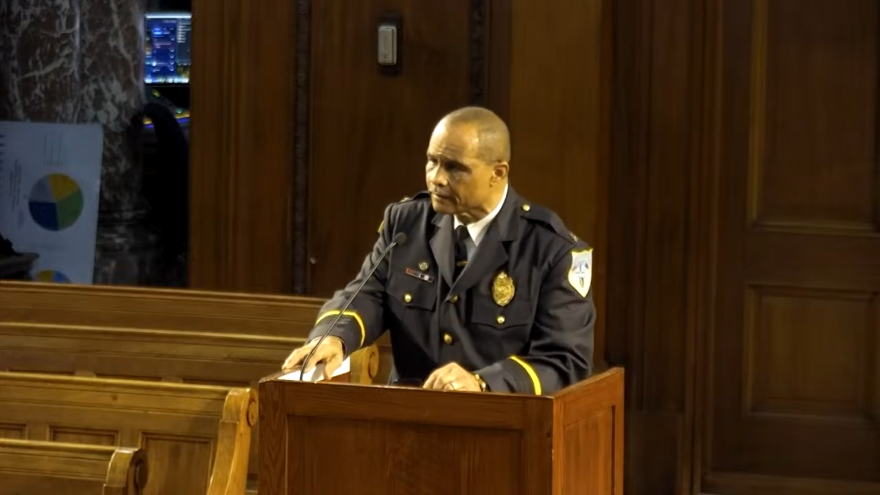Springfield Police Deputy Chief Lawrence Akers is one step closer to filling the role of superintendent after the latest city council meeting, which featured debates on the position itself as well as the powers of the Board of Police Commissioners.
Meeting Tuesday night, the council’s first piece of business was approving a home rule petition, which contained language that would exempt Akers from the state’s mandatory police retirement age of 65.
Currently serving as deputy chief at age 64, Akers would be allowed to fill the role of superintendent until age 70 under an act that needs approval from the Massachusetts legislature.
Akers spoke at the meeting, emphasizing his fitness and determination to take on the job after being tapped by Mayor Domenic Sarno to replace retiring superintendent Cheryl Clapprood.
“I feel that I would be a good choice for this, and if I do go on, beyond 65, and I didn’t feel that I could handle it, whether it be mentally or physically I would be the first one to put my hand up and say ‘I have to tap out,’ because I want what’s best for the city," Akers said.
Clapprood is slated to retire in April, a month shy of her 65th birthday, according to Councilor Lavar Click-Bruce.
The council voted unanimously to approve the language, but not before highlighting what at least one councilor saw as a potential issue.
Citing conversations he had with the retirement board, Councilor Victor Davila said he believed Akers would be unable to contribute to his pension past age 65 with his new wages as superintendent – something he considers unfair.
As the discussion continued, with Councilor Sean Curran saying that any city employee would collect 80 percent of their “top 3 or 5 years,” Councilor Zaida Govan raised the fact that Akers also does not currently live in Springfield – a matter he’d have to resolve in order to meet the city’s residency requirement.
Akers indicated he would be moving back to the city in which he lived for almost 60 years, and that he had only left recently in anticipation of retiring - all before being selected to potentially succeed Clapprood.
The other remaining items on the agenda proved more contentious.
The second piece of business included amending city code to codify the role of police superintendent and ensure all references to a police chief or police commissioner, in fact, mean “police superintendent.”
According to the council’s agenda, the item effectively swaps out the term “chief” for “superintendent” in the relevant section.
However, some councilors expressed concern, with Councilor Tracye Whitfield asking why language regarding hiring and promoting that had been previously discussed in a subcommittee was absent.
When it was clarified that Whitfield had been looking at a previous version of the ordinance and that the language had been updated by the city's law department, several councilors voiced frustration over how the Board of Police Commissioners had essentially been stripped of the ability to hire in a previous memorandum of understanding – a power several councilors, including Whitfield, wish to restore, as the council established back in 2018.
“I just feel like this memo came out – this is what the administration wanted – now we’re just going to go ahead and do what the administration wanted and make it legal. I don’t think that was the right way to do things I still don’t," the councilor said. "I don’t agree with that at all.”
A handful of council members sought to have the matter referred to the Public Safety Committee, along with another agenda item, but the vote failed 6-to-5. The item then passed 8-3.
It was considered a “first-step” vote, meaning the matter will be brought up again at another city council meeting.
The third item, which would amend and re-codify the role of the Board of Police Commissioners, appeared to reduce the scope of the section, eliminating language such as a part about the board being permitted to make “lawful rules for the maintenance of the Police Department.”
Citing a need to gain public input and satisfy what some councilors believed would be inevitable scrutiny from the U.S. Department of Justice if there was none, the council voted overwhelmingly to refer the item back to committee.
The city police department previously adopted a new use-of-force policy as part of a federal consent decree with the DOJ.
Councilor Davila added that by referring the item back to committee, the council would have a chance to re-examine the commission and how it is made up.
“I think this is a prime opportunity for us, sir, for this wise and humble body to take another look at this, the police commission," Davila said. "We have five members of this commission, all which are doing their best. But, I also think that this is a prime opportunity for us to look at its composition.”
Davila suggested a sixth seat be added and reserved for a retired Springfield police officer.
The city council meets again on March 11th.
UPDATE: Two, new Springfield City Council meetings were added to the city's meeting calendar a day after this report was filed. "Special Meetings" were scheduled to occur on Monday, Feb. 26 and Tuesday, Feb. 27 - both at 5 p.m.





